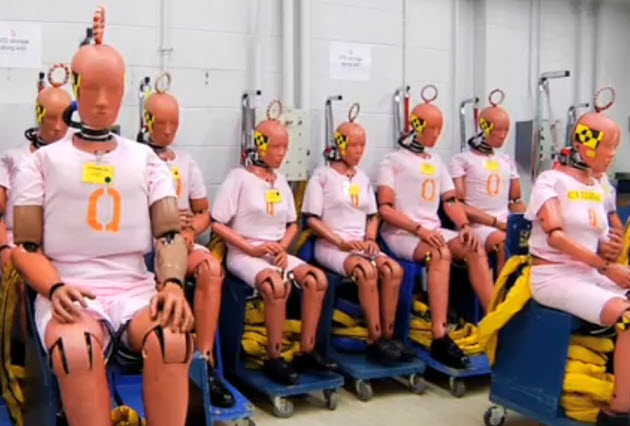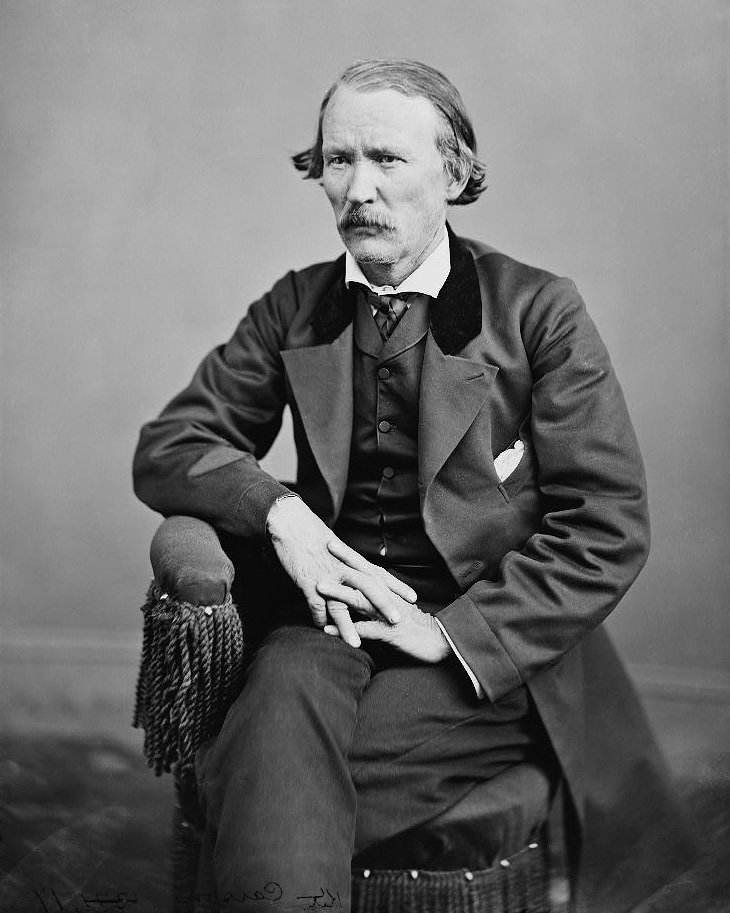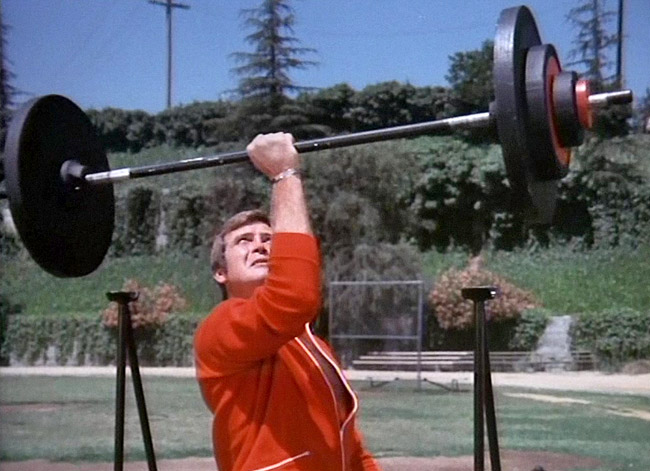Helen Gurley Brown just passed away. She sure knew how to work that bony ass. Here she is in the ’60s surviving original shock jock Joe Pyne, touting her eyebrow-raiser Sex and the Single Girl.
From a Kickstarter campaign for “Stompy,” which could be incredibly helpful in cleaning up disaster areas: “First of all, we’re building a giant walking robot that you can ride, and if all goes according to plan, we’ll be showing it off at a festival or fair near you. Depending on your level of support, you may even get to ride it or drive it – how about that?
Beyond that, though, your support for Project Hexapod will drive a personal robotics revolution (if we have anything to say about it). The past twenty years have seen an explosion of productivity in hobbyist robotics made possible by cheap, easy to use microcontrollers and RC servos. The hobbyist community has built a wealth of knowledge and infrastructure around these components, but RC servos severely limit the size of robot you can build.
Project Hexapod wants to make large-scale robots easier to build, and inspire people to build them.
Stompy is 6 giant steps towards that dream. Once we finish this robot, we’re releasing our plans, our CAD, our diagrams, the presentations from all the lectures we gave in class, our lists of materials and parts, everything. The construction and control techniques we’re using will drop the cost of controlled hydraulics by an order of magnitude or two from where they are now, and will make giant robots affordable to small groups of enthusiasts everywhere.
The robot isn’t just being built for fun, though – it has incredibly practical purposes, as well. With 6 force-sensitive legs and a ground clearance of 6 feet, the robot will be able to walk over broken terrain that varies from mountainous areas, to rubble piles, to water up to 7 or 8 feet deep – everywhere existing ground vehicles can’t go. Not only that, but while navigating such terrain, Stompy could carry 1,000 pounds at 2-3 mph, and up to 4,000 pounds at 1 mph. This is important because in disaster areas like Haiti’s Port Au Prince, it’s taken more than three years to clear the rubble out of some areas – meaning that throughout that entire time, people have had to be rescued or resupplied by helicopter, because no ground vehicle could reach them. Stompy (and the technology it represents) could easily reach people who can’t be reached by any other means in a natural disaster.” (Thanks Kurzweil)

“Do these people tell their children to go play near that asshole’s house cuz he aint gonna do shit?”
Why the f*** do you let your children play on my property? (I don’t get it)
People, why do you insist on letting your children play on my property? I mean, you own two big beautiful houses on the same block, why do your children always have to play on my property. It’s not like my house is the prettiest house on the block. In fact, its the ugliest. Why the fuck would you let your children play on my property? I don’t get it.
Sometimes I think to myself, Do these people tell their children to go play near that asshole’s house cuz he aint gonna do shit? Or are they just too ignorant to realize that their children are being disrespectful?
It’s not like their children do it behind their back. The parents of these little vermin are aware of what they’re doing and observing every move they make. Yet they still let them play on my property.
But if my nieces were to play on their property, they would be knocking on my door quick, fast, and in a hurry wanting to start some shit. I fuckin’ hate these ignorant parents. 20 years old and already shitted out 10 kids they can’t even control.
This is just sad if you ask me…. just sad.
Philosopher Herbert Marcuse imagined technology untangled from capitalism, but it’s difficult to see how that’s possible in the foreseeable future. Not if we want cheap tools delivered to masses of people. Though perhaps we’ll all end up doing genetic engineering. From “The End of Utopia“:
“In the form of a social productive force, these new vital needs would make possible a total technical reorganization of the concrete world of human life, and I believe that new human relations, new relations between men, would be possible only in such a reorganized world. When I say technical reorganization I again speak with reference to the capitalist countries that are most highly developed, where such a restructuring would mean the abolition of the terrors of capitalist industrialization and commercialization, the total reconstruction of the cities and the restoration of nature after the horror of capitalist industrialization have been done away with. I hope that when I speak of doing away with the horrors of capitalist industrialization it is clear I am not advocating a romantic regression behind technology. On the contrary, I believe that the potential liberating blessings of technology and industrialization will not even begin to be real and visible until capitalist industrialization and capitalist technology have been done away with.”
Tags: Herbert Marcuse
Jackie Robinson, a trailblazer and Hall of Famer who was politically complex, brought his legendary self to What’s My LIne? in 1969, three years before his death. At the 14:40 mark.
Tags: Jackie Robinson
Selling your life–or your life insurance policy, at least–to someone who’s betting on your quick demise seems as ghoulish as peddling a kidney. But are very unpleasant and very wrong necessarily the same thing? From James Vlahos’ New York Times Magazine article on the sensitive topic:
“Selling your life and selling a house have more in common than you’d think. The seller puts a listing on the market. Prospective buyers do research and get inspections; there are offers and counteroffers until the seller accepts a bid. The seller doesn’t literally peddle his own life, of course, but his life-insurance policy. The distinction is in many ways moot, however, as the sales value is inextricably linked to a cold-eyed estimation of how much longer the seller has to live. In the case of [Ruben] Robles’s policy, a life-settlement company in Georgia, Habersham Funding, expressed interest. Escobar shipped off six boxes’ worth of Robles’s medical records, thousands of pages in all, to Habersham. The firm, in turn, analyzed the records and also had them scrutinized by an external company specializing in life-expectancy analysis. Fiedler’s recollection is that the reports confirmed the grim prognosis and that Robles had less than two years left to live.”
••••••••••
Animated life-settlement discussion:
Tags: James Vlahos, Ruben Robles
The opening of an argument against the plausibility of the Singularity, via the Cognitive Social Web:
“Given that you are tech-savvy, by that point you have almost certainly come across the idea of the Singularity as defended by futurists like Ray Kurzweil and Vernor Vinge. As a reminder, it is the notion that, when we are at last able to compile a smarter-than-human artificial intelligence, this AI will in turn manage to improve its own design, and so on, resulting in an out-of control loop of ‘intelligence explosion’ with unpredictable technological consequences. (singularists go on to predict that after this happens we will merge with machines, live forever, upload our minds into computers, etc).
What’s more, this seemingly far-future revolution would happen within just a few decades (2040 is often mentioned), due to the ‘exponential’ rate of progress of science. That this deadline would arrive just in time to save the proponents of the Singularity from old age is just a weird coincidence that ought to be ignored.
Objection, your honor. As a scientist, I find the claim that scientific progress is exponential to be extremely dubious.”
From the December 4, 1902 Brooklyn Daily Eagle:
“Santa Monica, Cal.–Samuel Carson has been found dead up in his hut in Santa Monica Canyon. He had been bitten by a spider.
Carson was about 81 years old and claimed to be a son of the renowned scout ‘Kit’ Carson. For many years the old man had lived at the head of Rustic Canyon, with only his horses and dogs for company. Carson had a most picturesque career as a gold hunter, Indian fighter and adventurer.”
Tags: Kit Carson, Samuel Carson
- Old Print Articles: Teddy Roosevelt’s eagle dies from consumption (1899) + Gunplay leads to an engagement (1877).
- Featured Videos: Merv Griffin meets with Andy Warhol and Edie Sedgwick (1965), Salvador Dali (1965), Tallulah Bankhead and Willie Mays (1966), Timothy Leary (1966), Francis Ford Coppola (1979) + ESPN promo by Errol Morris + The first American Presidential press conference carried by satellite (1962) + B.F. Skinner didn’t believe in the idea of free will + Printing a home in less than a day + Ty Cobb appears on I’ve Got a Secret (1966).
- Recently Posted on NYC Craigslist: I’m not encouraging you to murder animals, but I’m not discouraging you, either + I smell like a graveyard, please hire me + I want you to be as big an asshole as I am + Even granny porn makes me competitive.
- Christine Rosen looks at the morality of our reliance on tech.
- In the ’60s, Manfred Clynes and Nathan Kline wanted to alter humanity.
- Bio-hackers are experimenting with real-life cyborgs.
- Manfred Clynes loves Chopin and cyborgs.
- Athletes should be able to take drugs that aren’t dangerous.
- Philip Zimbardo thinks the American male is in lots of trouble.
- Affordable Bootstrapping can cut the cost of interstellar building.
- Recently deceased critic Robert Hughes did not love network news.
- Gore Vidal felt America’s Cold War victory was a Pyrrhic one.
- Some people want to live in underwater sea colonies
- We haven’t achieved utopia, but we’re living in a golden age.
- Economists explain the best strategies for winning Olympic medals.
- The Asch Conformity Experiments revealed our desire to fit in.
- Humans (and computers) sometimes see faces where they aren’t.
- Some MIT hippy may have saved Apollo 13 from disaster.
- Japan is taking desperate steps to compete in a globalized world.
- Some Earth cities are suitable stand-ins for possible Martian cities.
- James Gleick examines the art of auto-correct.
- India’s poorest are making use of solar power.
- A brief note from 1896 about a bad nosebleed.
- A brief note from 1880 about a bad nose job.
- A brief note from 1877 about a dance.
- This week’s Afflictor keyphrase searches.
I put up a couple of posts this week about computer scientist Manfred Clynes (here and here), who, along with psychiatrist Nathan Kline, coined the term “cyborg” in 1960 for a theory they had that as humans began to travel in space they would have to incorporate silicone into their carbon in order to survive and thrive. It was the nascency of the space program and seemed no more far-fetched than anything else. From “Man Remade to Live in Space,” a 1960 Life magazine article that further investigated their cyborg theories:
“The cyborg idea, presented recently to an impressed Astronaut conference, was conceived by an unusual partnership of doctor and computer engineer. Dr. Nathan Kline is a famous psychiatrist and researcher in mental drugs at New York’s Rockland State Hospital. Engineer Manfred Clynes does computer studies at the same hospital on body cybernetics: the interrelationship of the body’s check-and-balance systems.
For cyborgs, Kline and Clynes dispense with most conventional space flight plans. Cyboorgs will wear sealed skintight suits but will travel in unsealed cabins exposed to the near vacuum of space. Ordinarily, at these low pressures the blood would boil and the lungs explode. But cyborgs’ lungs will be partly deflated and their blood will be cooled. To keep from getting numbed their brains will be warmed or fed energizers. Their messages to one another will be picked up electrically from their vocal nerves and transmitted by radio. Their mouths will be sealed and unused. Concentrated food will be piped direct to their stomachs or blood streams. Wastes will be chemically processed to make new food. Totally worthless end-products will be kept in small canisters on their backs. Kline’s and Clynes’ motives in developing cyborgs are not at all astronautic. Kline wants to work out the problems involved because the solutions will have vast implications for medicine as a whole. Clynes, an accomplished pianist, feels the artistic experiences to be had in space should not be overlooked. ‘Imagine,’ he says, ‘what leaps a ballet dancer could take on the moon.'”
Tags: Manfred Clynes, Nathan Kline
Pareidolia is our ability see a human face where there is none, like a religious figure in a piece of toast. Computers appear to have the same tendency. From Rebecca J. Rosen in the Atlantic:
“Pareidolia was once thought of as a symptom of psychosis, but is now recognized as a normal, human tendency. Carl Sagan theorized that hyper facial perception stems from an evolutionary need to recognize — often quickly — faces. He wrote in his 1995 book, The Demon-Haunted World, ‘As soon as the infant can see, it recognizes faces, and we now know that this skill is hardwired in our brains. Those infants who a million years ago were unable to recognize a face smiled back less, were less likely to win the hearts of their parents, and less likely to prosper.’
Humans are not alone in their quest to ‘see’ human faces in the sea of visual cues that surrounds them. For decades, scientists have been training computers to do the same. And, like humans, computers display pareidolia.”
••••••••••••
Audi “Faces” commercial:
Tags: Carl Sagan, Rebecca J. Rosen

“The world has never been richer, healthier, freer or more equal than it is today.” (Image by Steven Zwerink.)
There is still a lot of suffering the world, a lot of inequality. It’s no time to spike the football. But I largely agree with Fraser Nelson’s Telegraph article which argues that we’re living in a sort of golden age. An excerpt:
“It feels almost indecent to enjoy the Olympics so much. To spend a day at the Games is to move into a parallel universe, where things are actually going right for Britain and some mild rejoicing is justified. The Olympic motto, ‘Faster, Higher, Stronger,’ strikes a depressing contrast with a British economy showing none of these characteristics. Behind the jubilation lies a horrible feeling that when the Games end, we’ll be back to the grim reality: the Leveson Inquiry, the still-unravelling Budget and the slow-motion implosion of global capitalism.
There ought to be a name for this feeling: political myopia. It can afflict anyone who confuses what politicians do with what’s happening in the country, or what they say with what is going on in the world. Governments may be having a hard time of it, struggling with debt they ought not to have taken on. Noisy pressure groups who seek government funding may also believe that the sky is falling in. But a clear-headed analysis of the facts reveals something rather extraordinary. The crash has not even retarded, let alone halted, human progress. The world has never been richer, healthier, freer or more equal than it is today.” (Thanks Browser.)
Tags: Fraser Nelson
Ty Cobb, one of the absolute greatest baseball players ever and one of the damndest sons of bitches to strap on the spikes, appears in 1955 on I’ve Got a Secret. Seems like a sweet grandfather here, but he strangled to death at least eight or ten peanut vendors during his career. Cobb shows up at roughly the 12:15 mark, just as Johnny Vander Meer walks off with his complimentary carton of Winston cigarettes. The reason why Youtube was invented.
Tags: Johnny Vander Meer, Ty Cobb
I mentioned Manfred Clynes in a post earlier today. He co-authored a 1960 paper in which the term “cyborg” was coined. Here’s an excerpt from “Young Scientist Leads Two Lives,” a New York Times article about Clynes from that same year which looks at his parallel interest in music:
“Late one recent evening a bespectacled young man, struck the resounding final chords of a Chopin ballade, rose hesitantly from the piano and with a shy smile bowed to the applause of a small group at a home near here.
The guests knew they had heard a breathtaking performance by the boyish-looking chief research scientist of the Rockland State Hospital.
But many did not know that scientists had been excited recently by his findings on the relation between breathing and the rate of the heart beat. They were equally ignorant of the high praise he had won from European and Australian music critics several years ago.
Manfred Clynes, born in Vienna and educated in Budapest and Australia, is still in his early thirties. He is a cyberneticist (computer scientist) and concert pianist who can look back on friendship with the late Dr. Albert Einstein and on notable accomplishments with such diverse instruments as the analog computer and the concert grand.
Since 1957 his small laboratory, resembling the back room of a radio-television repair shop, has seen pioneering experiments in applying computers and missile-control theory to medicine.”
Tags: Manfred Clynes
A lecture about printing a home in less than a day, as presented at TED by USC professor Behrokh Khoshnevis. Kinda great, although I don’t think slums are merely a problem of construction.
Tags: Behrokh Khoshnevis
From Ben Popper’s new Verge consideration of the queasy topic of bio-hacking and the advent of the real-life cyborg:
“In one sense, Mary Shelley’s Frankenstein, part man, part machine, animated by electricity and with superhuman abilities, might be the first dark, early vision of what humans bodies would become when modern science was brought to bear. A more utopian version was put forward in 1960, a year before man first travelled into space, by the scientist and inventor Manfred Clynes. Clynes was considering the problem of how mankind would survive in our new lives as outer space dwellers, and concluded that only by augmenting our physiology with drugs and machines could we thrive in extraterrestrial environs. It was Clynes and his co-author Nathan Kline, writing on this subject, who coined the term cyborg.
At its simplest, a cyborg is a being with both biological and artificial parts: metal, electrical, mechanical, or robotic. The construct is familiar to almost everyone through popular culture, perhaps most spectacularly in the recent Iron Man films. Tony Stark is surely our greatest contemporary cyborg: a billionaire businessman who designed his own mechanical heart, a dapper bachelor who can transform into a one man fighter jet, then shed his armour as easily as a suit of clothes.
Britain is the birthplace of 21st century biohacking, and the movement’s two foundational figures present a similar Jekyll and Hyde duality. One is Lepht Anonym, a DIY punk who was one of the earliest, and certainly the most dramatic, to throw caution to the wind and implant metal and machines into her flesh. The other is Kevin Warwick, an academic at the University of Reading department of cybernetics. Warwick relies on a trained staff of medical technicians when doing his implants. Lepht has been known to say that all she requires is a potato peeler and a bottle of vodka.”
Tags: Ben Popper, Manfred Clynes, Mary Shelley, Nathan Kline
From the May 19, 1877 Brooklyn Daily Eagle:
“The inmates of the Lunatic Asylum were favored with a hop last evening. Two musicians furnished the music. About three hundred patients, male and female, were present, and enjoyed themselves for nearly two hours. Order and decorum were observed during the evening.”
Francis Ford Coppola speaking with Merv Griffin in 1979, at the end of an insanely brilliant decade of work in which he directed four classics: the first two Godfather films, The Conversation and Apocalypse Now.
Tags: Francis Ford Coppola, Merv Griffin
Drugs that are safe should be legal for everyone, and athletes should be able to use any legal drugs. In the near future, more and more safe performance-enhancing drugs and treatments will become available. The lives of the average person will be much improved by them, and athletic performance will hit new peaks. The idea that progress is somehow a perversion of the “purity” of competition is silly. From Yascha Mounk’s “Ban What Is Dangerous, Legalize What Is Not” in the New York Times:
“The distinction we currently draw between which substances should be allowed, and which should be prohibited, ultimately says a lot about our own arbitrary assumptions – and precious little about anything else. Fans admire athletes for their amazing skill and boundless determination. As long as all athletes have access to performance-enhancing drugs, winning would still require that awe-inspiring skill and determination. So, while there are good reasons to ban those drugs that pose significant health risks even when taken under medical supervision (dinitrophenol comes to mind), all other substances – like erythropoietin (EPO) and propranolol, for example – should be allowed.”
Tags: Yascha Mounk
























